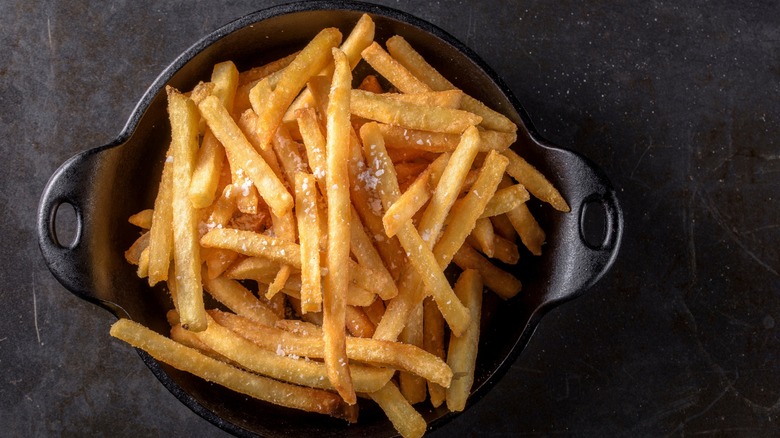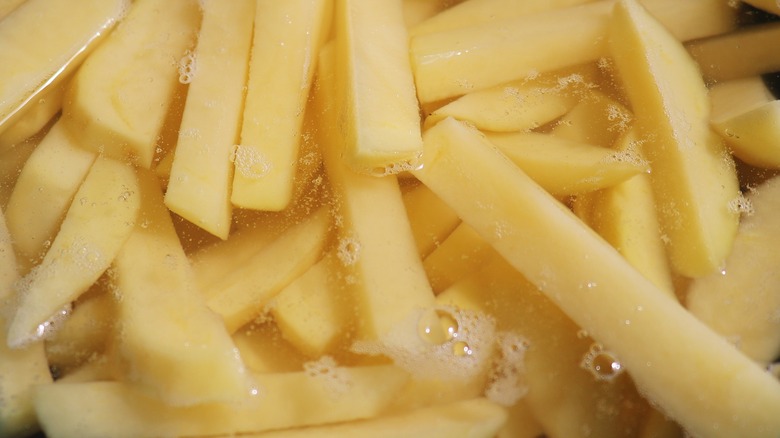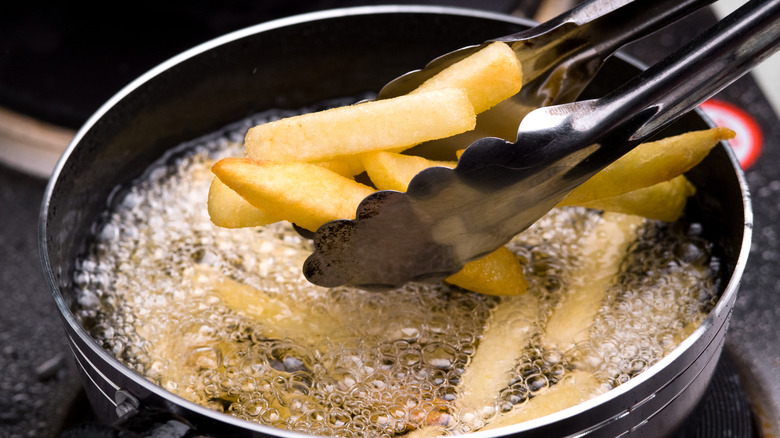Here's How Long You Should Be Soaking Potatoes For Crispy Fries
For as simple and uncomplicated as they seem, French fries are really difficult to get just right. And by just right, we mean a soft, fluffy interior with a pleasantly crisp shell. If you've tried deep frying, air-frying, and oven roasting a batch of fries only to be disappointed by the lackluster results, you're definitely not alone. Many professional cooks agree that soaking your fries in water before they're cooked makes for excellent results. But, are we talking for a few minutes, or a few days? The Takeout asked a couple of experts to chime in, and both of them agreed that a soak is an absolute must, but their time recommendations were pretty different.
Bob Bennett, Executive Chef at Ann Arbor, Michigan's Zingerman's Roadhouse, told us, "I think it's super important to soak and rinse fries ... we rinse them three times with cold water and then soak them ... for about 24 hours in cold water." Culinary creator, award-winning fashion designer, and lifestyle expert Peter Som agrees, but his soak time is much shorter. He suggests, "Soak your fries for about 30 minutes minimum and up to an hour in cold tap water ... you can soak them overnight but remember to pat them very dry before frying, otherwise your fries will be limp and sad."
Potatoes don't crisp up well without a dip in water because of one thing: starch.
Soaking potatoes accomplishes more than you think
Along with corn, white potatoes contain the highest level of starch among their vegetable peers. The complex carbohydrate is an important part of a balanced diet, but it can also weigh down potatoes when you're trying to get them nice and crispy. Peter Som explained, "Soaking fries before frying removes excess starch, resulting in golden crispy fries with a fluffy inside. If you skip this step, you'll get the opposite effect — and nobody wants that in a fry."
Bob Bennett agreed, but believes soaking potatoes in water accomplishes other things as well. He suggested, "The biggest reason we [soak potatoes in water] is to first clean the potato and second is to rinse off excess starch. I think this really helps the fries in the cooking process. The soaking is pretty important as it helps stop the potatoes from oxidizing or turning brown."
Potato experts at Idaho Potato suggest that any amount of time in the water will benefit potatoes in becoming better fries, from a few minutes to overnight. But the outlet also believes adding a little acid (like vinegar) to your soaking water is better than using plain H2O when it comes to keeping the spuds a nice color with no brown discoloration.
Best fries ever
Now that you've got your soaking time down, it's important to note that there are other factors to consider if you're looking to make perfect, crispy fries. For starters, the type of potato you use matters. Russets and Idaho potatoes are excellent choices because they'll have a nice, fluffy interior once they're cooked. While other varieties make the best mashed potatoes (like waxy types), Russets and Idahos have lower moisture content, which will make for a crispier fry.
Unlike sautéing, where several different oils can work best, oils with a high smoke point are best for deep frying potatoes. Peanut, canola, and safflower oil all fit the bill. The oil should be hot — about 375 degrees Fahrenheit — in order to get a super crisp fry. If the oil is not hot enough, the potatoes will absorb too much oil, making the fries taste unpleasantly greasy.
If you'll be air-frying your fries, follow these basic air fryer rules, and make sure you don't crowd the basket. If the potatoes are too close together or piled on top of each other, the steam will keep the fries from becoming crispy. And if oven-frying is your preference, it's a good idea to preheat your baking sheet. When you add your oil-coated potatoes to the pan, they will immediately start to crisp and cook on the hot surface. Be sure to toss the fries halfway through baking so they cook evenly.


